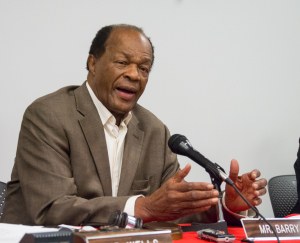BY ELIAS BENDA, OPINIONS EDITOR AND HENRY SHULDINER, SPORTS EDITOR, MARIA BRESCIA-WEILER, FEATURES EDITOR

Marion Barry, the former four-term mayor of DC and Ward 8 councilmember, passed away on November 23 at the age of 78. There is probably no more well known or controversial political figure in the city’s history.
He was confronted with issues of racism at a young age, growing up in the Deep South of Mississippi and Tennessee. By the time he got to LeMoyne College, Barry began his involvement in the Civil Rights movement, becoming President of the college NAACP. His activism continued into his graduate years studying organic chemistry at Fisk University, where he participated in the Nashville sit-in movement, and was elected as first chairman of the Student Nonviolent Coordinating Committee (SNCC) in 1960, working alongside Martin Luther King Jr., Fannie Lou Hamer, and other major civil rights leaders.
His role in SNCC eventually led him to DC, where he established the local SNCC chapter. His social activism and organization came at a critical moment when the city was grappling with the aftermath of the 1968 riots. He was one of the more important “civil rights activists in DC” according to senior Tyler King.
Barry was elected to the DC Board of Education from 1971-74, where he supported funding for education and raises for teachers. Barry advocated for budget autonomy, claiming that the lack thereof was the majority-white Congress expressing their lack of trust in a majority black government.
He ran for and won a seat as an at-large councilmember in the city’s first government in 1974, and in 1978 ran in the Democratic primary elections for Mayor against incumbent Mayor Walter Washington, and won, making Barry the second mayor of the capital city.
One of his earliest, largest, and most important programs was the introduction of the Student Youth Employment Program, ensuring every student in DC had a job over the summer. Sophomore Jordan Carpenter, a current SYEP participant said “He was really influential towards children and a lot of people in the earlier generation voted for him many times and a lot of people wondered why, but then again when you think about it, it wouldn’t be that hard to vote for him since he helped out with the city so much.” But many city problems, such as soaring drug use, violence, and unemployment, marred his time in office.
Barry’s mayoral tenure was riddled with accusations of corruption, the most infamous of which was the FBI/DC police sting in which Barry was caught with his former girlfriend turned police informant Hazel Diane Moore smoking crack cocaine on camera, and the subsequent arrest where he uttered his famous line, “the b*tch set me up!” Charged with three federal counts of perjury, and ten of criminal drug possession, Barry was sentenced to six months in federal prison.
He was released from prison in April of 1992, and by that fall he was back on the DC Council in the Ward 8 seat. He then ran and won the Mayoral candidacy in 1994, surprising the country and expressing his permanent political status in Washington. After leaving office in 1998, Barry contemplated running for an at-large seat, but rescinded the possibility when police found traces of marijuana and cocaine in his car in 2002.
“The negative aspects of Barry’s career often are the more focused on”
Barry returned to DC politics in 2004, where he won the Ward 8 council seat once again, which he held until his death this Sunday past.
The negative aspects of Barry’s career often are the more focused on. After his death, a TMZ headline read “Marrion Barry…Crack Mayor…Dead at 78.” When Julie Caccamise’s DC history class was asked what they know about Marion Barry, the first responses included “He smoked crack” (senior Max Avilles); “He served six months in jail” (senior Megan Bell); and “Didn’t he like bankrupt the city?” (senior Sarah Bass). It is apparent that Barry was often pilloried in the media, the reflection of which is evidenced in class..
“He’s historically looked out for lower class, underprivileged African Americans.”
Yet, there was a positive aspect to Barry’s politics, which some are keen to recognize and applaud him for. “He’s historically looked out for lower class, underprivileged African Americans” senior Billy Wiltshire said.
“I think he was a positive for the city overall because I think in many ways he opened the doors for African Americans in the city to participate openly in politics,” Caccamise said, “not just by making decisions by voting but by participating in upper levels of government.”
Throughout the district, a variety of opinions and viewpoints can be heard regarding the only four-term mayor of DC. Senior Jonathan James ponders an age old question that is very applicable to Barry’s life: “Why are you missed more when you’re dead? He only got a shrine after he died.” Much of the negative stigma that surrounded Barry when he was alive has disappeared now, after his death. Whether he is perceived with derision, appreciation, or respect, people will long remember both positive and negative aspects of Marion Barry’s storied career and influence in the District of Columbia’s politics. “He had a big impact of DC,” said senior Jock Pollock. “He will be greatly missed.”